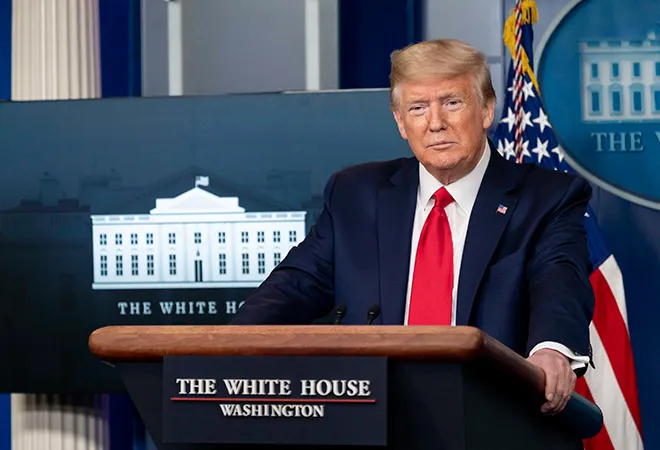-
CENTRES
Progammes & Centres
Location

Conventional wisdom suggests foreign policy rarely wins elections. More so in the US, as major foreign policy agendas through the Cold War and in the immediate aftermath of the 9/11 attacks, enjoyed bipartisan rigour. In a two-party system, this mostly impeded presidential candidates from staking positions that were in significant contrast to one another. More importantly, research has shown that the American electorate tends to have “little concrete foreign policy information” and often defers to coastal elites on matters that are distant.
To that point, historians often point to the re-election bid of President George H W Bush. Going into the 1992 elections, the forty-first president had an overwhelming approval rating of nearly 90 percent following the 1991 Gulf War. The political effect of the first war televised live around the world, was apparent. In August 1990, following Iraq's invasion of Kuwait, two-thirds of Americans approved of Bush's handling of the situation. Once the US-led coalition forces overran Saddam Hussein’s forces, more than eight in ten backed Bush. A year later, Bush however lost his reelection bid to the then-Arkansas Governor Bill Clinton’s focus on the looming recession and bout of unemployment. Encapsulated in the Clinton campaign’s “It’s the economy, stupid!” mantra, the unseating of Bush signified pocket-book issues to be paramount in US elections.
Thus, foreign policy successes may not attract votes. However, failures or mishandled challenges abroad do have an untoward electoral impact for an incumbent.
One major foreign policy election in contemporary US history was in 1980, between then-incumbent President Jimmy Carter and former California Governor Ronald Reagan. As a testament to foreign policy successes hardy mattering in elections, Carter’s successful brokering of the Camp David Accords — encompassing a peace treaty to establish diplomatic relations between Israel and Egypt, accrued little commendation.
But in face of an energy crisis as a result of the continued effects of the OPEC oil embargo of 1973 and a slump in Iranian energy production due to the Islamic Revolution of 1979, Carter mistakenly construed it as a “crisis of confidence” to call for mandatory conservation and gasoline rationing. This became “campaign fodder” for the Reagan campaign, and an opportunity to underscore Carter’s foreign policy missteps/inaction against the domestic backdrop of an already teetering US economy, rising unemployment and high inflation. Hence, in promising an era of renewed American assertiveness, the Reagan campaign made political hay out of Carter’s failure to prevent the fall of the US-allied Mohammad Reza Shah Pahlavi regime in Iran, the resultant siege on the US Embassy in Tehran which oversaw 52 Americans being taken hostage for 444 days, and the 1979 Soviet invasion of Afghanistan.
To make matters worse, the Carter administration’s covert rescue operation for US hostages in Tehran met a disastrous fate. Operation Eagle Claw bungled to result in deaths of eight US servicemen. One of Carter’s senior political aides was later known to have reacted to the failed mission with an ominous epiphany: “We just lost the election.” Eventually, Carter did lose to be reduced to a one-term president, and also became the first incumbent since Herbert Hoover in 1932 to lose a reelection bid.
To avoid meeting Carter’s fate, in the run up to the 2020 elections, Trump has sought to eclipse the challenge presented by the COVID19 pandemic with validations for the America First worldview.
Even as it becomes increasingly clear that a global pandemic cannot be tackled without an equally global response, the Trump administration has proposed cuts to US foreign aid programs for “fiscal year 2021 by 21 percent”. Drawing on the America First impulse against transnational cooperation and multilateral fora of global governance, the proposed cut includes “35 percent of funding for global health programs, amounting to around $3 billion and encompassing a reduction of 50 percent in U.S. support for the World Health Organization.”
Furthermore, far from cobbling a coalition of large economies or like-minded partners to combat the pandemic, the Trump administration has been accused of engaging in “modern piracy”. Allied nations like France and Germany have alleged the US to have engaged in “Wild West” tactics to exorbitantly overbid for equipment like medical-grade masks — at times to even overturn previously placed orders. There have also been reports of the Trump administration coaxing US manufacturers like 3M to divert N95 respirator masks originally meant for export purposes. As a result, export to Canada, Mexico, Asian and Latin American countries is expected to take a hit. In one case, an order of 200,000 masks bound for Germany from a 3M factory in China was even “confiscated” by US officials in Bangkok.
This bears electoral significance, as Trump in 2016 derived much legitimacy by rallying against “Washington elites” and their pursuit of an internationalist foreign policy at the “unacceptable outcomes to average citizens”. Pinning them as instances of globalisation undercutting US interests, Trump galvanised those that were disgruntled either over inadequate market access in partner nations or job losses in the industrial mid-West owing to cheap immigrant labor or outsourced production. Thus, with the case of Trump gutting aid programs and engaging in outbidding and confiscation of supplies bound for other nations, Trump seems to be putting into action America First’s commitment to protect the US homeland “even if—or especially if—it irritates global elites.”
The relevance of foreign policy issues in the upcoming election will go beyond the pandemic’s rationalisation of nativist tendencies in support for Trump’s America First worldview. Across the aisle as well, an active deliberation over the US’ role in the world is underway. Although Sen. Bernie Sanders (I-VT) recently suspended his presidential campaign and paved way for former Vice President Joe Biden to become the presumptive nominee for the Democratic Party, the tussle between their respective progressive and moderate factions is far from settled.
In 2016, with an increasingly inward-looking electorate, Democrats had a rude awakening with respect to their worldview in face of a Republican candidate who rallied against the erstwhile consensus on liberal internationalism and US stewardship abroad. Although that was also in large-parts due to the then-Democratic nominee Hillary Clinton’s own primacist foreign policy track record as US secretary of state (2009-13), Joe Biden could run into similar challenges.
During his time in the Senate, Biden is known to have voted for several measures that have come under great scrutiny since. For instance, Biden voted to authorise the George Bush administration’s invasion of Iraq following the 9/11 attacks, and voted for both — the North American Free Trade Agreement (NAFTA) and Permanent Normal Trade Relations (PNTR) with China. In contrast, Sen. Sanders during his time in the US House of Representatives voted against all of the above.
Over the years, as the Republican and Democratic parties’ fulcrum has shifted into their respective populist corners, opposition to those measures have emerged as odd points of convergence. Both parties’ marginal factions fault the erstwhile bipartisan consensus on the US maintaining regional balances of power through the use of military force and being a benevolent promoter of economic interdependency. On US military adventurism abroad, the two sides’ emergent factions converge against “endless wars” that sap the US of valuable blood and treasure.
On the US’ commitment to free trade, apart from faulting it for causing a loss of manufacturing jobs, there is a convergence — albeit for slightly varying reasons. The populist right’s heightened socio-cultural focus also faults those agreements for encouraging an open-borders immigration agenda. Whereas, the progressive left’s rising socio-economic priorities deride those agreements on account of their impediment to progressive initiatives like raising the minimum wage at home.
Hence, going forward, the reimagination of the liberal worldview — to bring together moderate and progressive positions on the US’ role abroad, will be imperative in the Democrats’ bid to peel off voters from Trump’s electoral arithmetic. And compounded with the COVID19 pandemic’s validation of America First impulses, the upcoming US election is certain to be one dominated by deliberations over US foreign policy.
The views expressed above belong to the author(s). ORF research and analyses now available on Telegram! Click here to access our curated content — blogs, longforms and interviews.

Kashish Parpiani is Senior Manager (Chairman’s Office), Reliance Industries Limited (RIL). He is a former Fellow, ORF, Mumbai. ...
Read More +